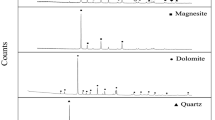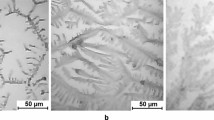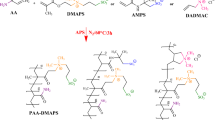Abstract
IT has been noted1 that cetyl-trimethyl-ammonium bromide is a collector for (that is, induces floatability of) several different types of mineral. The minimum effective concentration of the compound (threshold concentration) required to induce flotation differs from mineral to mineral, but when the concentration has been increased to a value lying between 100 mgm. and 500 mgm. a litre, flotation ceases to be possible for all minerals. This is about the concentration (280 mgm. a litre) at which micelle formation of the ammonium salt becomes considerable2.
This is a preview of subscription content, access via your institution
Access options
Subscribe to this journal
Receive 51 print issues and online access
$199.00 per year
only $3.90 per issue
Buy this article
- Purchase on Springer Link
- Instant access to full article PDF
Prices may be subject to local taxes which are calculated during checkout
Similar content being viewed by others
References
Wark, I. W., J. Phys. Chem., 40, 661 (1936).
Adam, N. K., and Shute, H. L., Trans. Farad. Soc., 34, 759 (1938).
Author information
Authors and Affiliations
Rights and permissions
About this article
Cite this article
WARK, E., WARK, I. Influence of Micelle Formation on Flotation. Nature 143, 856–857 (1939). https://doi.org/10.1038/143856b0
Issue Date:
DOI: https://doi.org/10.1038/143856b0
This article is cited by
-
Physically sorbed collectors in froth flotation and their activity. Part II
Journal of Mining Science (2009)
Comments
By submitting a comment you agree to abide by our Terms and Community Guidelines. If you find something abusive or that does not comply with our terms or guidelines please flag it as inappropriate.



